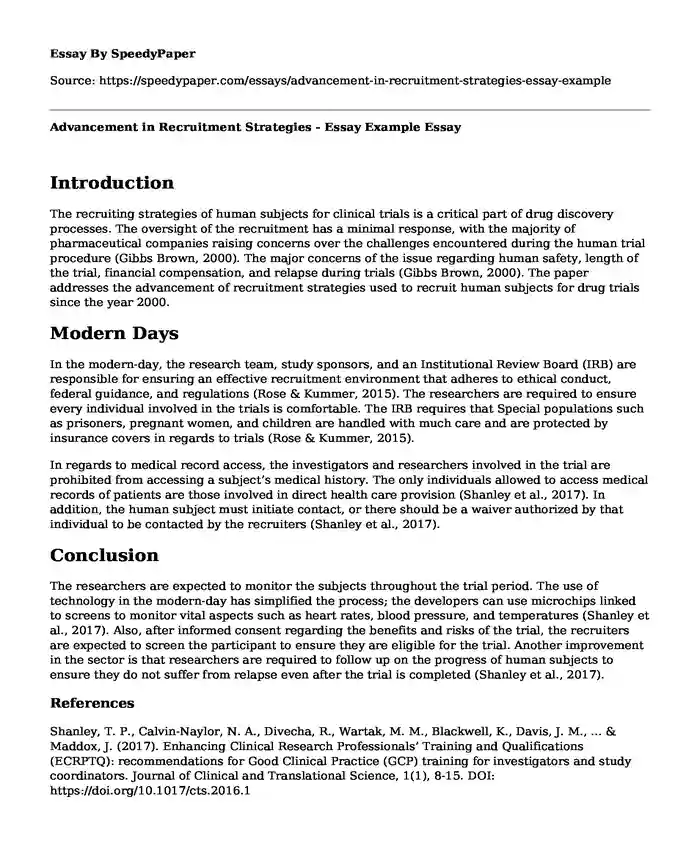
| Type of paper: | Essay |
| Categories: | Human resources |
| Pages: | 2 |
| Wordcount: | 465 words |
Introduction
The recruiting strategies of human subjects for clinical trials is a critical part of drug discovery processes. The oversight of the recruitment has a minimal response, with the majority of pharmaceutical companies raising concerns over the challenges encountered during the human trial procedure (Gibbs Brown, 2000). The major concerns of the issue regarding human safety, length of the trial, financial compensation, and relapse during trials (Gibbs Brown, 2000). The paper addresses the advancement of recruitment strategies used to recruit human subjects for drug trials since the year 2000.
Modern Days
In the modern-day, the research team, study sponsors, and an Institutional Review Board (IRB) are responsible for ensuring an effective recruitment environment that adheres to ethical conduct, federal guidance, and regulations (Rose & Kummer, 2015). The researchers are required to ensure every individual involved in the trials is comfortable. The IRB requires that Special populations such as prisoners, pregnant women, and children are handled with much care and are protected by insurance covers in regards to trials (Rose & Kummer, 2015).
In regards to medical record access, the investigators and researchers involved in the trial are prohibited from accessing a subject’s medical history. The only individuals allowed to access medical records of patients are those involved in direct health care provision (Shanley et al., 2017). In addition, the human subject must initiate contact, or there should be a waiver authorized by that individual to be contacted by the recruiters (Shanley et al., 2017).
Conclusion
The researchers are expected to monitor the subjects throughout the trial period. The use of technology in the modern-day has simplified the process; the developers can use microchips linked to screens to monitor vital aspects such as heart rates, blood pressure, and temperatures (Shanley et al., 2017). Also, after informed consent regarding the benefits and risks of the trial, the recruiters are expected to screen the participant to ensure they are eligible for the trial. Another improvement in the sector is that researchers are required to follow up on the progress of human subjects to ensure they do not suffer from relapse even after the trial is completed (Shanley et al., 2017).
References
Shanley, T. P., Calvin-Naylor, N. A., Divecha, R., Wartak, M. M., Blackwell, K., Davis, J. M., ... & Maddox, J. (2017). Enhancing Clinical Research Professionals’ Training and Qualifications (ECRPTQ): recommendations for Good Clinical Practice (GCP) training for investigators and study coordinators. Journal of Clinical and Translational Science, 1(1), 8-15. DOI:
https://doi.org/10.1017/cts.2016.1
Rose, K., & Kummer, H. (2015). A New Ethical Challenge for Institutional Review Boards (IRBs)/Ethics Committees (ECs) in the Assessment of Pediatric Clinical Trials. Children, 2(2), 198–210.
https://doi.org/10.3390/children2020198
Gibbs Brown, J. (2000). OFFICE OF INSPECTOR GENERAL Recruiting Human Subjects Pressures in Industry-Sponsored Clinical Research.
http://dl.icdst.org/pdfs/files3/2a6b13497b02b0eb72152a146e8433cb.pdf.
Cite this page
Advancement in Recruitment Strategies - Essay Example. (2023, Dec 25). Retrieved from https://speedypaper.net/essays/advancement-in-recruitment-strategies-essay-example
Request Removal
If you are the original author of this essay and no longer wish to have it published on the SpeedyPaper website, please click below to request its removal:
- Studying Is the Key to Success, Free Essay Example
- Philosophy Essay Sample: Who Is an Existentialist
- Free Essay on Healthcare Staff Trends and Impact on Human Resource
- Free Essay with Rites of Passage Research
- Pemsel and Wiewiora
- Essay Sample on Organizational Behavior and Work
- Free Essay Sample: Women's Suffrage Movement and Women's Liberation Movement
Popular categories




